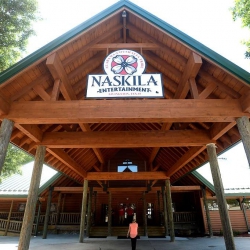
The Alabama-Coushatta tribe once filed a lawsuit against ex-lobbyist Jack Abramoff and former Christian Coalition leader Ralph Reed for their alleged lobbying excesses.
The Naskila Gaming entertainment center in East Texas has become a target for Texas officials who consider gambling to be anathema. The electronic bingo center located in the Piney Woods north of Houston is a lightning rod of controversy.
The Alabama-Coushatta tribe own and operate the Naskila Gaming entertainment center. The electronic bingo hall is located in a rustic building on the tribe’s reservation land.
The Naskila Gaming Entertainment Center
About 400 people work at the bingo hall, including 200 Alabama-Coushatta tribe members – roughly one-sixth of the tribe’s membership. The Naskila Gaming Center, named after a type of dogwood tree species in the area, generates about $5 million a year.
Carlos Bullock, a former chairman of the Alabama-Coushatta’s tribal council, told ABC News, “We are in the fight for our future. This is something, a revenue stream, that can help the tribe immensely.”
Texas Views the Gaming as Illegal
Attorneys for the State of Texas have an entirely different view. They see the gaming operation as illegal. They cite a law passed 15 years ago to shut down a full-scale casino the Alabama-Coushatta tribe ran at the time. That casino existed on the same site that the electronic bingo hall now sits.
The land was given to the tribe by the Texas Republic’s first president, Sam Houston. During the Texas War of Independence from Mexico, the Alabama and Coushatta tribes refused to recognize Mexican authority over Texas.
The tribes sided with the Texan independence movement and were rewarded by Sam Houston for their loyalty. A third tribe, the Kickapoo, were rewarded the same way. The Kickapoo were recognized by federal authorities in 1983, but with no ban on gaming. They now operate the state’s only legal gaming center, at Eagle Pass along the Texas-Mexico border.
2002 Injunction against Tribal Gaming
As for the Alabama-Coushatta tribe, the Texas Department of Justice wants the 2002 injunction enforced. They also want the tribe to be held in contempt. On Thursday in Beaumont, the two sides argue their cases in federal court.
Anne Marie Mackin, an Assistant Attorney General of Texas, said the gaming machines at the Naskila center are illegal. Mackin said, “The machines operated at Naskila are not a permissible form of ‘bingo’ and as a result, still cannot be operated without state oversight.”
1988 Tribal Gaming Compact Laws
The tribe argues that their gaming operation is legal under the U.S. Indian Gaming Regulatory Act. That act was approved by the U.S. Congress in 1988, in response to a landmark 1986 Supreme Court case which categorized recognized tribal lands as sovereign territory. If the 3-member National Indian Gaming Commission and the US Department of the Interior’s Indian Bureau recognize a tribe’s sovereign lands, then certain forms of gaming are legal.
The 365 electronic bingo machines are classified as Class II gambling. While the gaming machines look like classic slot machines, their results are determined using a bingo game mechanic. Under federal law, they are considered different than Class III gambling, which includes poker, slot machines, blackjack, and other table games. The Alabama-Coushatta tribe say the 2002 law banned Class III gaming.
Bullock said, “When we closed in 2002, we lost 300 jobs. That was a difficult time for the tribe and tribal members, people who had begun relying on that income. That’s what makes it so important we do everything legally and correctly because we can’t afford to lose those jobs again.”
1987 Ban on Tribal Gaming
Unfortunately, the Alabama-Coushatta tribe is a victim of bad timing. In 1987, under the federal Restoration Act, the Alabama-Coushatta and the Tiguas of El Paso were recognized by the U.S. fedreal government. To achieve that recognition, both tribes agreed to a prohibition on gaming.
Carlos Bullock says their timing was wrong, but more recent events changed the equation. Pointing out that the state has legalized horse and dog racing, as well as lottery games, since the 1987 decision, former Chairman Bullock said that they are held to a different standard.
While the tribe is bound by “a fluke of timing“, Bullock said, “The state can change its mind, but we’re held by this resolution.“
